Key takeaways:
- Understanding the importance of compliance and attention to detail in international trade is crucial for avoiding costly mistakes and fostering successful market entry.
- Embracing challenges in international trade as opportunities for growth enhances resilience and adaptability, vital qualities in a shifting regulatory landscape.
- Future trends indicate a move towards digital trade laws, sustainability in agreements, and inclusivity for smaller enterprises, shaping a more equitable trading environment.
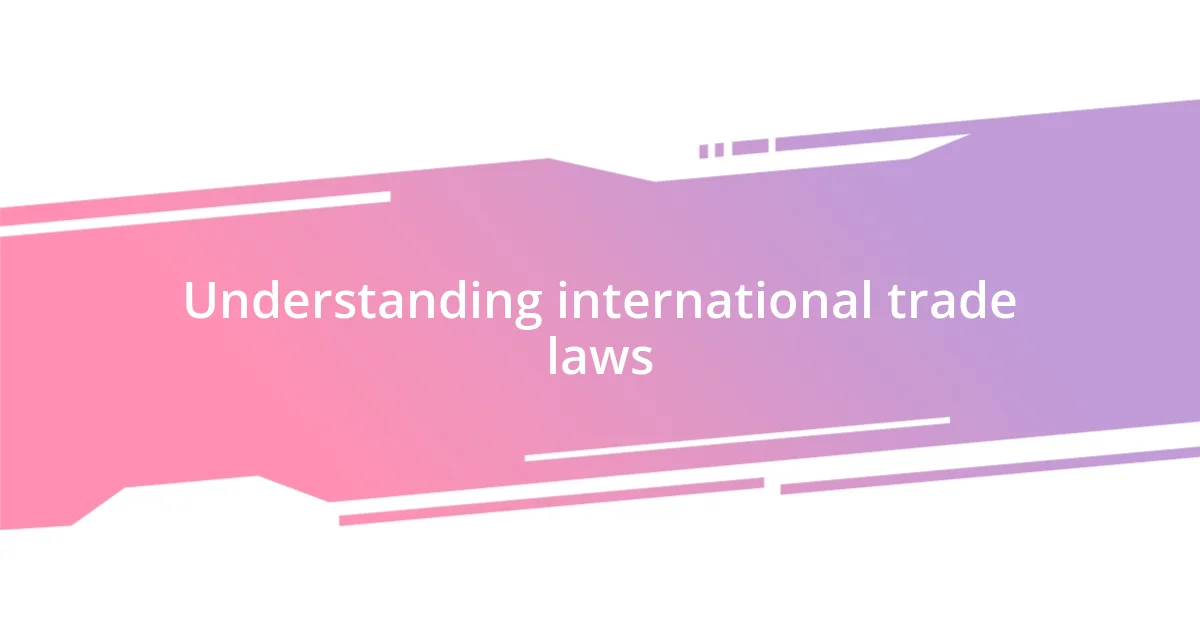
Understanding international trade laws
Understanding international trade laws can feel overwhelming, especially when you consider the complexities involved. When I first encountered these laws, I remember feeling lost amongst the jargon and various regulations. Have you ever had that experience of diving into a subject only to feel like you’re in over your head? That initial confusion is common, but with time, I learned that these laws exist to create a fair and structured trading environment between nations.
As I navigated through trade agreements, tariffs, and regulations, I began to see how they impact businesses on a global scale. For instance, the rules surrounding export and import duties can make or break a young company trying to enter foreign markets. I once worked with a start-up struggling due to unexpected tariffs. It was a stark reminder that these laws aren’t just abstract rules; they directly affect people’s livelihoods and opportunities.
Understanding these laws also means recognizing the importance of compliance. I recall a situation where a minor oversight led to penalties for my team. It was a frustrating moment that drove home the point that attention to detail is crucial in this field. When considering international trade, I often ask myself: how can we ensure that we not only follow these laws but also leverage them to create advantageous opportunities? This mindset shift was key in my learning journey.
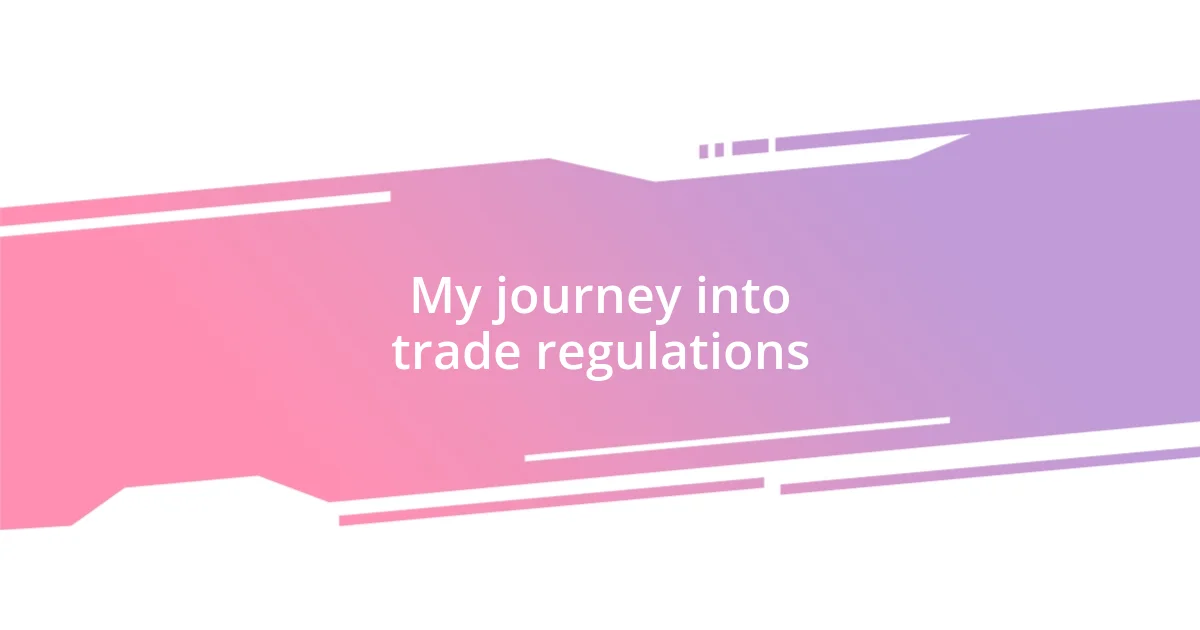
My journey into trade regulations
As I ventured deeper into the world of trade regulations, I found myself constantly learning and adjusting. Initially, the intricacies of duties and customs classifications perplexed me. I can still recall a moment when I spent hours poring over documentation, only to realize I had misclassified an item. That moment was a mix of embarrassment and determination, and it spurred me to dive deeper into understanding these critical aspects.
One of the turning points in my journey was attending a seminar on trade compliance. Listening to industry experts share their experiences resonated with me. I realized that others had faced similar hurdles. It felt reassuring, knowing that I wasn’t alone in this labyrinth of regulations. Connecting with fellow attendees sparked invaluable discussions that filled gaps in my knowledge, and suddenly, the complexities didn’t seem quite as daunting anymore.
Through this exploration, I’ve developed a keen appreciation for the nuances of international trade laws. There was a project where my team and I had to strategize our approach to entering a new market. We felt the weight of ensuring compliance, but that pressure taught us the value of collaboration and vigilance. The thrill of successfully navigating compliance for that project was immensely satisfying, showcasing that mastering trade regulations can transform challenges into remarkable achievements.
| Milestone | Lesson Learned |
|---|---|
| Miscalculation of customs classification | The importance of accuracy and attention to detail |
| Attending trade compliance seminar | Value of networking and shared expertise |
| Successful market entry project | Collaboration can turn compliance challenges into successes |
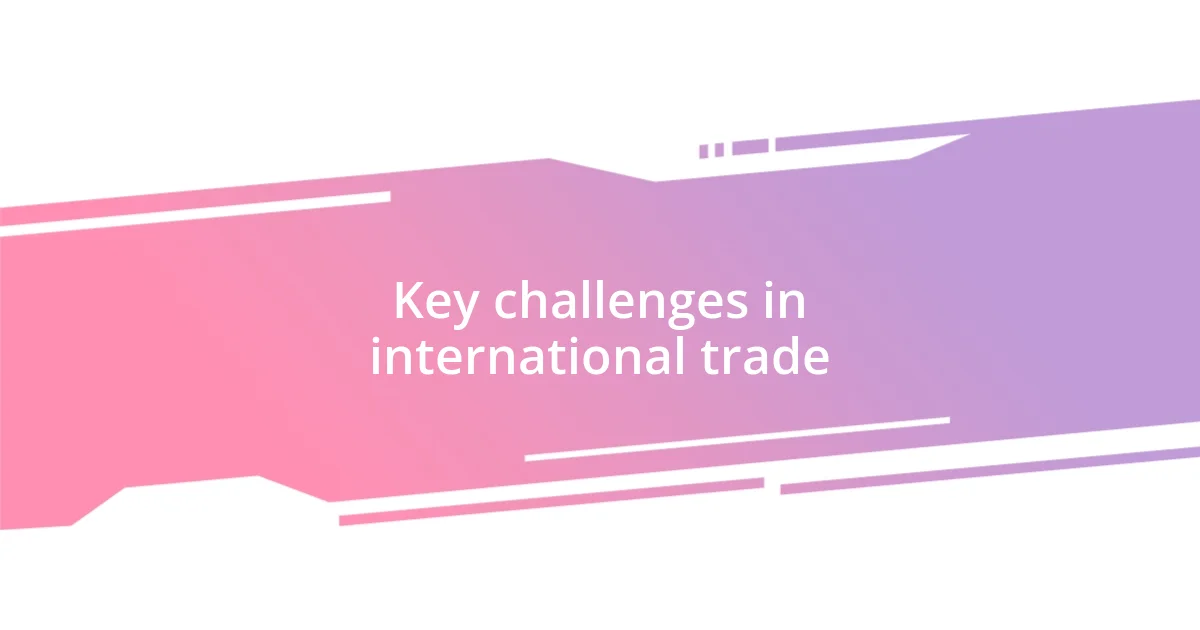
Key challenges in international trade
Navigating international trade presents a unique set of challenges that can feel both overwhelming and exhilarating. For instance, I remember grappling with the variability of trade regulations across different countries. One moment, I felt confident about a deal, only to discover that specific local laws almost scuttled the entire transaction. This unpredictability can force businesses to be constantly on their toes, adjusting strategies as they learn about the different landscapes of international law.
Here are some of the most pressing challenges I’ve encountered in international trade:
- Cultural Differences: Understanding cultural norms can greatly affect negotiations and partnerships.
- Language Barriers: Miscommunication due to language differences can lead to costly mistakes.
- Regulatory Compliance: Adhering to varied regulatory frameworks can be daunting and time-consuming.
- Political Instability: Changes in government or policies can abruptly shift trading conditions.
One key takeaway from my experience is that while these challenges can be intimidating, each hurdle is an opportunity for growth. Embracing this mindset transformed my approach to trade. When I faced a setback with a partner missing critical compliance documents, it became a chance to refine our processes and enhance communication. The experience taught me resilience and adaptability—qualities that are invaluable in the constantly changing arena of international trade.

Strategies for compliance with laws
Engaging with international trade laws requires a proactive approach to compliance, and I’ve learned that establishing clear internal procedures is essential. A few years back, my team and I implemented a compliance checklist for every new project. This system not only minimized errors but also fostered a sense of accountability within the team. Don’t you think having a standardized approach can alleviate some of the stress that comes with navigating complex regulations?
Moreover, regular training sessions have become a cornerstone of our compliance strategy. I vividly remember a workshop where we dissected real-world case studies of businesses facing penalties for non-compliance. It was eye-opening to see how small oversights could lead to significant consequences. These sessions not only keep us informed but also create an environment where we can learn from others’ experiences. How often do you think organizations prioritize continuous learning when it comes to compliance?
Finally, I can’t stress enough the importance of fostering strong relationships with legal and compliance experts. I recall reaching out to a trade lawyer to review our contract with a new supplier. Their insights were invaluable, ultimately saving us from potential pitfalls. Building a network of trusted professionals can make all the difference; it empowers you with knowledge while ensuring that your compliance journey is well-supported. Wouldn’t you agree that collaboration with experts provides a safety net in such a high-stakes field?
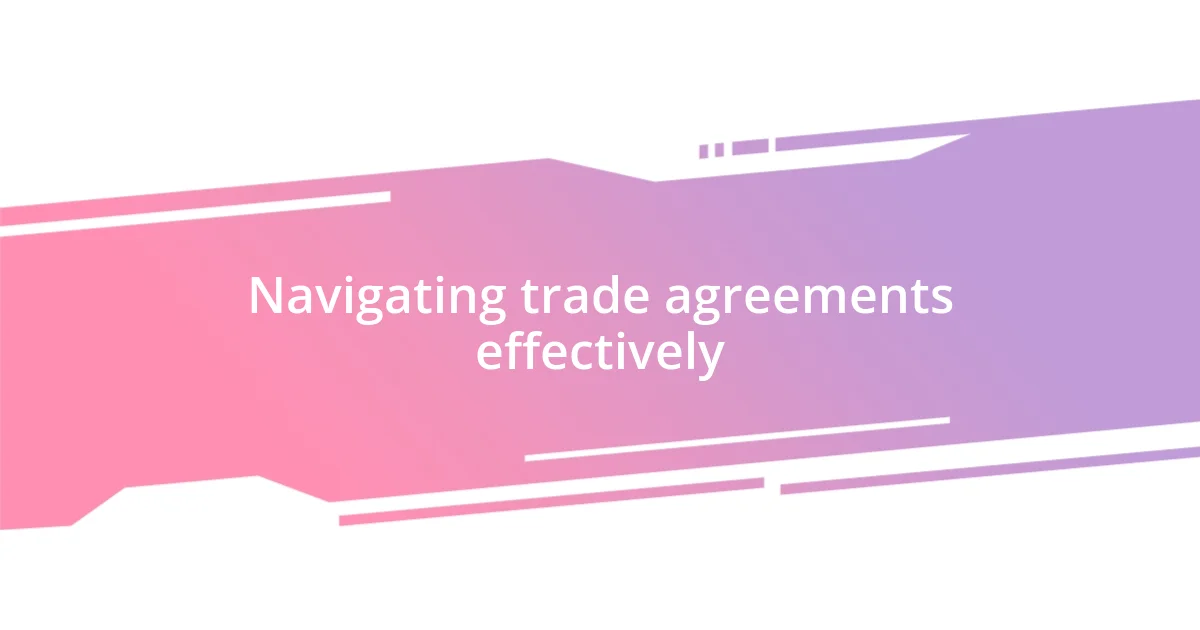
Navigating trade agreements effectively
Navigating trade agreements effectively requires a blend of preparation and adaptability. I remember my first significant trade negotiation—an exhilarating experience that taught me the importance of understanding the fine print. As we sat around the table, I realized that every clause had potential implications I hadn’t considered. Isn’t it fascinating how a single word can alter the entire context of a deal? That experience made me appreciate the need for meticulous attention to detail when evaluating trade agreements.
One strategy that I found invaluable is to familiarize myself with the specific terms of trade agreements before entering negotiations. I once encountered a situation where I overlooked a tariff concession that could have saved my company substantial costs. The realization was frustrating, yet it cemented a crucial lesson: never underestimate the power of doing your homework. How often do we think we know enough, only to be surprised by hidden gems of information?
Lastly, I’ve learned the art of building rapport with counterparts from different countries. During a particularly challenging negotiation, we took the time to understand cultural nuances, which helped break the ice. By sharing a few personal stories, we transitioned from adversaries to partners with shared goals. It’s remarkable how empathy in business can create pathways for collaboration, wouldn’t you say? Establishing these connections can lead to smoother negotiations and reinforce trust, making it easier to navigate even the toughest trade agreements.
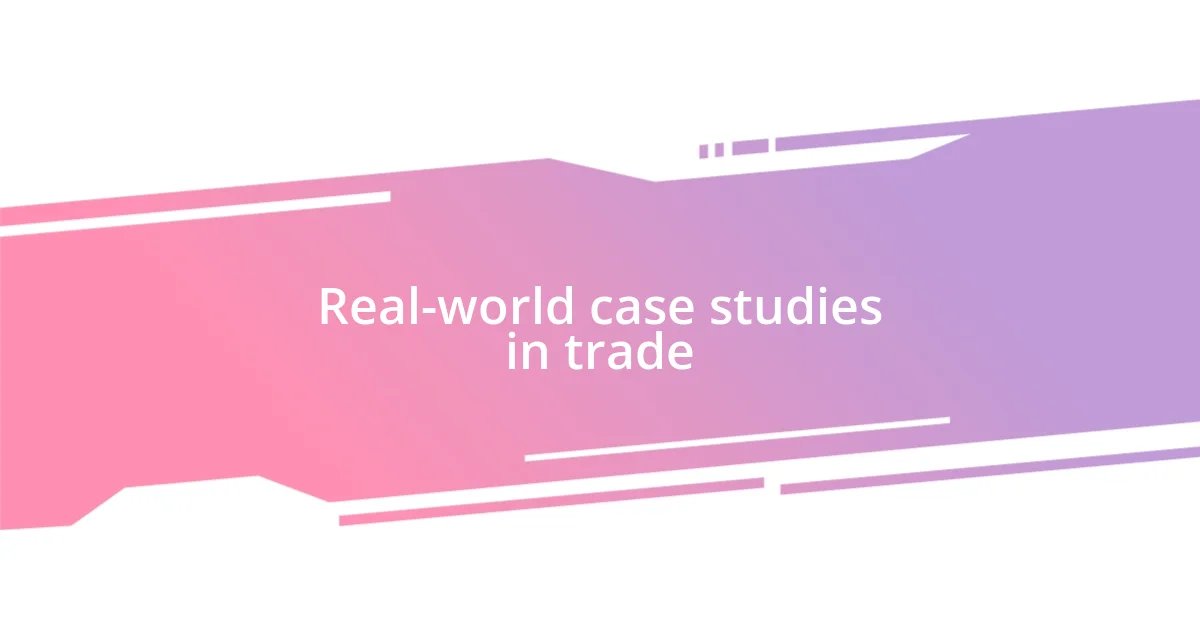
Real-world case studies in trade
One real-world example that sticks with me is the case involving a U.S.-based electronics company that faced hefty penalties for inadvertently violating export control regulations. They shipped products to a customer without realizing the end-user had ties to restricted entities. It was a stark reminder that due diligence is more than just a checkbox; it’s about understanding the deeper implications of our actions in international trade. Have you ever considered how a seemingly innocuous transaction can have far-reaching consequences?
Another insightful case was that of a small textile manufacturer who underestimated the impact of trade tariffs on their pricing strategy. They were shocked when their once-competitive products became pricier overnight, leading to a decline in sales. I felt their frustration; it was a lesson on how vital it is to keep abreast of changing trade policies. Can you imagine pouring your heart into a business only to see it falter because of a regulatory shift you didn’t anticipate?
Then there’s the infamous situation with a multinational corporation that faced sanctions due to its business activities in a disputed territory. They had to reevaluate entire supply chains and forge new partnerships, ultimately retracting years of established relationships. I was captivated by their resilience; it demonstrated how adaptability is crucial in trade. Have you ever found yourself in a position where you had to rethink your strategies to stay afloat? It’s moments like those that showcase the unpredictable nature of international trade.

Future trends in global trade laws
Looking ahead, I can’t help but notice a growing trend toward digital trade laws. As companies increasingly rely on e-commerce, regulations surrounding data privacy and cross-border data flows are evolving rapidly. When I launched an online platform for my business, I was surprised by how much red tape I had to navigate regarding data protection laws in different countries. It’s astonishing how the digital landscape is reshaping global trade—have you ever thought about how your data travels globally?
Another future trend I’m observing is the emphasis on sustainability in trade agreements. Governments are starting to incorporate environmental criteria into their trade negotiations. I remember participating in a conference where we discussed the potential impact of carbon tariffs; it really struck me how the demand for eco-friendly practices is not just a passing phase. Isn’t it inspiring to think that trade laws can drive us toward a greener planet?
Moreover, the future may also bring an increased focus on inclusivity in trade policies. I’ve often contemplated the struggles smaller enterprises face when entering international markets. If we can craft laws that provide better access and support for these businesses, we might just level the playing field. Wouldn’t it be empowering to see a new wave of diverse players in global trade?












